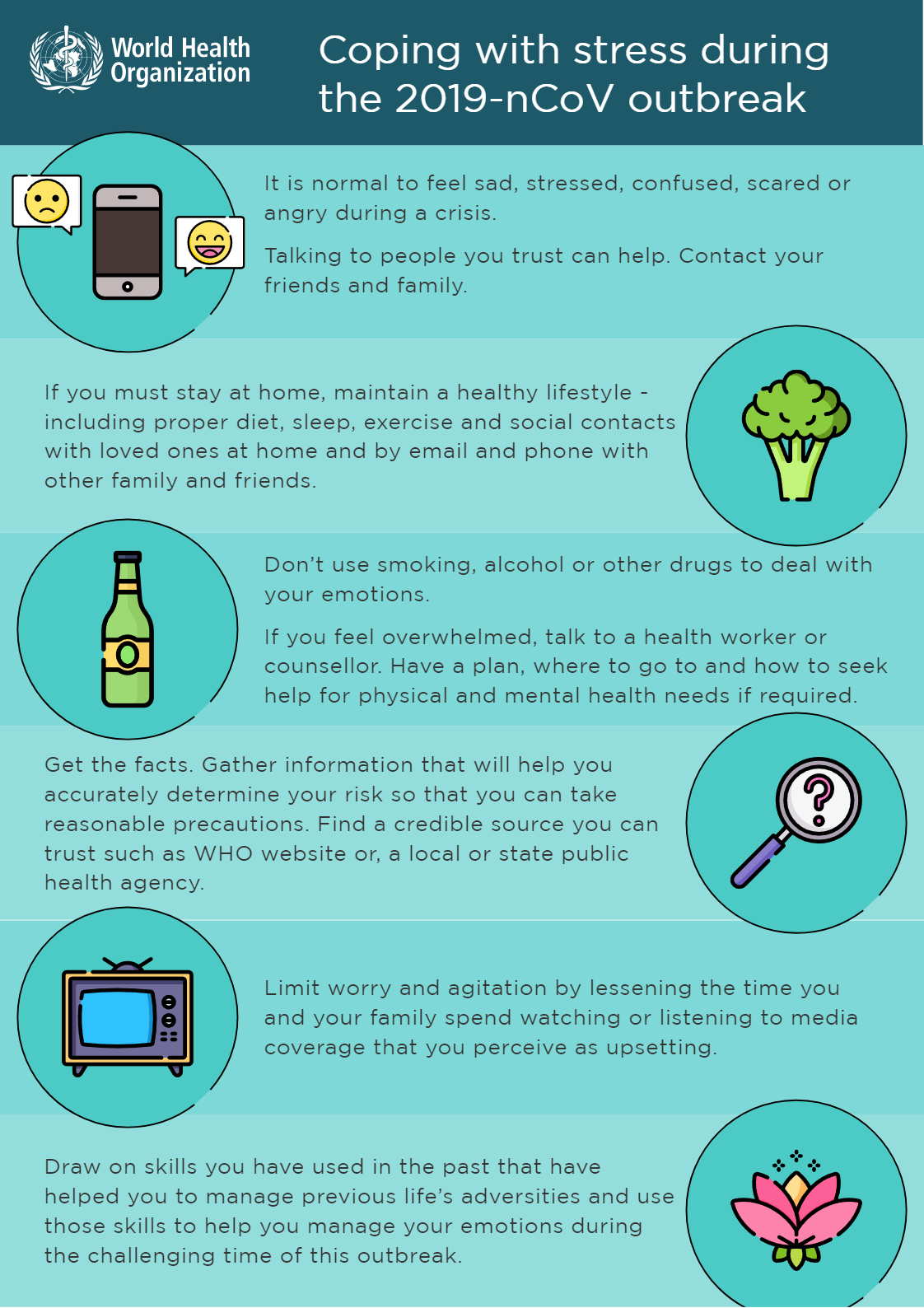The professional body for Psychologists and Counsellors in the Bahamas.
Send Us A Message
Call Us Today
Bahamas Psychological Association
Covid-19 Resources
What is Coronavirus?
According to the World Health Organization, the novel coronavirus also known as COVID-19 is a new strain of the already existing category of virus. The novel coronavirus has a range of symptoms, some of which are mild, and others that can be severe and life threatening.
WHO lists the most common symptoms of the novel coronavirus:
-
Most common symptoms of the Novel coronavirus
- Respiratory Symptoms
- Fever
- Cough
- Shortness of Breath
- Breathing Difficulties
-
More severe symptoms can be deadly
- Pneumonia
- Severe acute respiratory syndrome
- Kidney failure
-
Who is Most at Risk?
Children and healthy adults are more likely to have mild or no symptoms, however everybody can contract the illness and spread it. The most at risk groups are the elderly, people who are immunocompromised, people with preexisting respiratory issues, and smokers.
-
How to Protect Against Coronavirus
Coronavirus is contagious, even if a person shows no signs or symptoms of illness. Take a few extra precautions to help protect yourself and others from contracting the disease.
- Regularly wash hands with soap and water for at least 20 seconds.
- Use hand sanitizer when you don’t have access to soap and water.
- Hand sanitizer is effective and sanitizng up to three times before you will need to wash your hands again.
- If your hands are visibly dirty, it is recommended to use soap and water.
- Avoid touching face with hands, particularly the eyes, nose and mouth.
- Avoid close contact with people. WHO recommends staying at least 3 feet away from somebody who is coughing and sneezing.
- Cover your nose and mouth with a tissue when sneezing. If no tissues are available, use your elbows.
Source: World Health Organization
General Resources for Coronavirus (COVID-19)
If you, or a loved one are experiencing signs and symptoms of Covid-19 call a healthcare provider. The Government of The Bahamas has provided the following resources for those who have questions and concerns regarding Covid-19.
-
Ministry of Health Agencies
- Elizabeth Estates Clinic – (242) 324-2897 ; 324-2923
- Fleming Street Clinic – (242) 322-6720 ; 322-1321
- Flamingo Garden Clinic – (242) 361-6429 ; 361-6430
- South Beach Health Centre (242) 392-1783 ; 392-2123
-
Surveillance Unit
Ministry of Health
Tel: (242) 502-4790/4776 or 4737
In Grand Bahama, contact
Tel: (242) 350-6700 ext. 2353 or (242) 359-4541
-
Coronavirus COVID-19 Hotlines
Tel: (242) 376-9350 ; 376-9387 ; 376-9357
Email: covid19@bahamas.gov.bs
-
Facts about COVID-19
Visit our page on COVID-19 for information and resources.
The Bahamas Ministry of Health keeps a page updated with COVID-19 information everyday.
World Health Organization (WHO) Dispelling Common Myths about Coronavirus (Covid-19) provides clarity and clears up misinformation regarding the coronavirus pandemic.
-
Mental Health Resources COVID-19
The COVID-19 outbreak can be a difficult and trying time for many. Experiencing fear, stress, and anxiety is normal under these circumstances. Visit our page on coping with stress during the COVID-19 outbreak.
-
Resources for Helping Children Cope with COVID-19
Children have been heavily affected by changes related to the COVID-19 outbreak. For resources on helping children understand and cope with these changes, visit our page on Helping Children Cope. Other resources listed include supplemental educational material to help keep children active and learning while school’s are closed.
-
Professional Resources for COVID-19
The mental health and well-being of our society must be addressed during this global crisis. Visit our page for COVID-19 resources for mental health professionals.
-
COVID-19 Resources for Kreyòl Speakers
Visit our page on the COVID-19 outbreak with resources for Kreyòl speakers.
-
COVID-19 Resources
- Coping with Stress during COVID-19 Outbreak
- If you are experiencing anxiety and panic because of the global coronavirus outbreak, visit our page on managing stress and anxiety in relation to the novel coronavirus.
- Helping Children Cope with Stress during COVID-19 Outbreak
- Children may experience stress as a result of changing of COVID-19. Visit our page on helping children to cope with stress for information and child-friendly resources to help support children.
- COVID-19 Resources in Kreyòl Ayisyen
- COVID-19 resources for kreyòl speakers.
- COVID-19 Resources for Mental Health Professionals
- Resources to help guide mental health professionals during the COVID-19 outbreak.
COVID-19 Resources in Kreyòl Ayisyen
Professional Resources for COVID-19
Resources for Children
Guidance For Covid-19 Prevention and Control in Schools
Coping with Stress During COVID-19 Outbreak
While it is important to take precautions against the novel coronavirus, experiencing too much anxiety or panicking can be harmful to yourself or others. The best response to the coronavirus is to follow the advice of experts and preparing appropriately and being reasonably cautious.
Avoid Over Consumption of Media
In the case of the coronavirus, it is important to be aware and up-to-date about local news regarding the novel coronavirus. Other global news that does not directly impact you can cause stress if overconsumed. Limit your exposure to such reports if you find yourself experiencing anxiety or panic.
Follow Expert Advice
Some fear and anxiety about coronavirus may be relieved by taking proactive steps to prevent catching the disease. Follow the advice of experts and practice basic hygiene tips to decrease your likelihood of acquiring the novel coronavirus.

Source: World Health Organization
Mental Health Resources
Virus Anxiety provides free resources for those dealing with anxiety, stress, financial fears, and xenophobia regarding the Coronavirus (Covid-19) pandemic. It also provides resources for parents in order to help them support children during this time.
Helping Children Understand COVID-19
Explaining Coronavirus to Children
Bahamas Psychological Association
The professional body for Psychologists and Counsellors in the Bahamas.
Bahamas Psychological Association






